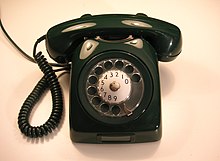phone
Jump to navigation
Jump to search
English[edit]

Pronunciation[edit]
Etymology 1[edit]
Clipping of telephone; attested by 1884.
Alternative forms[edit]
Noun[edit]
phone (plural phones)
- A device for transmitting conversations and other sounds in real time across distances, now often a small portable unit also capable of running software etc.
- Hyponyms: cell phone, speakerphone, clamshell phone, flip phone, mobile phone, smartphone
- Daragh's on the phone at the moment. He'll call you when he's finished.
- My phone ran out of battery.
- There's an old-fashioned phone in the doctor's waiting room - it doesn't work anymore, of course.
Derived terms[edit]
- answer phone
- bag phone
- banana phone
- bar phone
- bat-phone
- bat phone
- brick phone
- burner phone
- burn phone
- buzzer phone
- camera phone
- candlestick phone
- candy bar phone
- can I use your phone
- car phone
- car-phone
- cell-phone
- cell phone lot
- cellular phone
- cordless phone
- door phone
- entry-phone
- entry phone
- feature phone
- flip-phone
- have more chins than a Chinese phone book
- hold the phone
- home phone
- house phone
- Jesus phone
- money phone
- Obama phone
- on the phone
- pay phone
- phone bank
- phone book
- phone booth
- phone box
- phone call
- phonecall
- phone card
- phone hacking
- phone home
- phone-in
- phone-in show
- phone jack
- phone jail
- phoneless
- phone line
- phone monkey
- phone number
- phone-out
- phone-sex
- phone sex
- phone survey
- phone tag
- phone tree
- phone zombie
- phonicate
- pick up the phone
- pornophone
- rotary phone
- satellite phone
- slide phone
- slider phone
- smart phone
- speakerphone
- stick phone
- swivel phone
- touch-phone
- touch phone
- trap phone
- what is your phone number
- what's your phone number
- wireless phone
- world phone
Descendants[edit]
- → Burmese: ဖုန်း (hpun:)
- → Hindustani:
- → Irish: fón
- → Persian:
- Dari: فون (fōn)
- → Portuguese: fone
- → Welsh: ffôn
Translations[edit]
telephone — see telephone
See also[edit]
Verb[edit]
phone (third-person singular simple present phones, present participle phoning, simple past and past participle phoned)
- (transitive) To call (someone) using a telephone.
Derived terms[edit]
Terms derived from phone (etymology 1—verb)
Translations[edit]
to call (someone) on the telephone
|
Etymology 2[edit]
From Ancient Greek φωνή (phōnḗ, “sound”).
Noun[edit]
phone (plural phones)
- (phonetics) A speech segment that possesses distinct physical or perceptual properties, considered as a physical event without regard to its place in the phonology of a language.
Derived terms[edit]
Related terms[edit]
Translations[edit]
speech segment
|
Anagrams[edit]
French[edit]
Pronunciation[edit]
Noun[edit]
phone m (plural phones)
- phon (a unit of apparent loudness)
- (linguistics) phone
Verb[edit]
phone
- inflection of phoner:
Further reading[edit]
- “phone”, in Trésor de la langue française informatisé [Digitized Treasury of the French Language], 2012.
Categories:
- English 1-syllable words
- English terms with IPA pronunciation
- English terms with audio links
- Rhymes:English/əʊn
- Rhymes:English/əʊn/1 syllable
- English terms derived from Proto-Indo-European
- English terms derived from the Proto-Indo-European root *bʰeh₂- (speak)
- English clippings
- English lemmas
- English nouns
- English countable nouns
- English terms with usage examples
- English verbs
- English transitive verbs
- English terms derived from Ancient Greek
- en:Phonetics
- French 1-syllable words
- French terms with IPA pronunciation
- French terms with audio links
- French terms derived from Proto-Indo-European
- French terms derived from the Proto-Indo-European root *bʰeh₂- (speak)
- French lemmas
- French nouns
- French countable nouns
- French masculine nouns
- fr:Linguistics
- French non-lemma forms
- French verb forms
- fr:Acoustics
